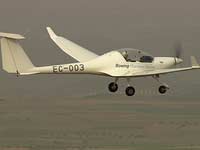Boeing has announced a successful test of the world's first hydrogen fuel-cell powered plane.
The two-seater Dimona aircraft took off on a series of test flights in Spain in February and March and stayed aloft for around 20 minutes, about half its current operational flight time.
The plane uses a combination of batteries and a proton exchange membrane fuel-cell for power.
Both systems are used for takeoff and climbing but, once the plane reaches its 3,300ft cruising altitude, the batteries are shut down and the fuel-cell keeps the plane running at 62 mph.
"Boeing is working to develop new technologies for environmentally progressive aerospace products," said Francisco Escarti, managing director at Boeing Research & Technology Europe.
"We are proud of our pioneering work during the past five years on the Fuel Cell Demonstrator Airplane project.
"It is a tangible example of how we are exploring future leaps in environmental performance, as well as a credit to the talents and innovative spirit of our team."
Boeing does not envisage fuel-cells ever being able to provide power for flight on large commercial aircraft, but is looking at the possibility of integrating such technology into commercial flights to power instrumentation and auxiliary flight systems.

